
IEEE Open Journal of Power Electronics
Scope & Guideline
Catalyzing Ideas, Driving Change in Power Electronics
Introduction
Aims and Scopes
- Power Conversion Technologies:
Research related to various power conversion methods including DC-DC, AC-DC, and DC-AC converters, highlighting new topologies and control strategies that enhance performance and efficiency. - Control Strategies for Power Electronics:
Development and analysis of advanced control techniques for power electronic systems, including model predictive control, robust control, and real-time optimization to improve system stability and performance. - Reliability and Fault Tolerance:
Investigation of reliability issues in power electronics systems, including fault detection, condition monitoring, and the design of fault-tolerant converters to ensure operational safety and longevity. - Emerging Materials and Devices:
Exploration of new materials (such as wide-bandgap semiconductors) and device technologies that enable higher efficiency, power density, and thermal performance in power electronic converters. - Smart Grid and Renewable Energy Integration:
Research on the integration of renewable energy sources into the grid through power electronics, including the development of smart grid technologies and grid-forming converters. - Wireless Power Transfer:
Innovative approaches to wireless power transfer systems, emphasizing efficiency, coupling techniques, and applications in consumer electronics and electric vehicles. - Modeling and Simulation Techniques:
Advancements in modeling and simulation methodologies for power electronics systems, including hardware-in-the-loop (HIL) testing and digital twin technologies.
Trending and Emerging
- Advanced Control Algorithms:
There is a growing emphasis on the development of advanced control algorithms that leverage machine learning and artificial intelligence to optimize the performance of power electronic systems. - Decentralized Energy Systems:
Research on decentralized energy systems, including microgrids and distributed energy resources, is on the rise, focusing on the integration of renewable energy and improving grid resilience. - Electric and Autonomous Vehicles:
The intersection of power electronics with electric vehicle technology is increasingly prominent, highlighting converter designs and charging solutions tailored for electric and autonomous vehicles. - Thermal Management Solutions:
Innovative thermal management techniques for power electronics, particularly in high-density applications, are gaining traction as the demand for reliability and efficiency increases. - Digital Twin and Simulation Technologies:
The application of digital twin technology and advanced simulation methodologies for real-time monitoring and predictive maintenance of power electronics systems is emerging as a significant area of interest. - Cybersecurity in Power Electronics:
With the rise of smart grids and interconnected power systems, there is an increasing focus on cybersecurity measures to protect power electronic systems from cyber threats. - Integration of IoT with Power Electronics:
The integration of Internet of Things (IoT) technologies with power electronic systems is becoming more prevalent, allowing for enhanced monitoring, control, and data analytics.
Declining or Waning
- Traditional Power Converter Topologies:
Research on conventional power converter designs has seen a downturn as newer, more efficient topologies gain traction and dominate the field, such as modular multilevel converters. - Linear Control Techniques:
The focus on classical linear control methods has diminished in favor of more sophisticated and adaptive control strategies that can handle the complexities of modern power electronic systems. - Analog Circuit Design for Power Electronics:
There is a noticeable decrease in publications centered on traditional analog circuit design for power electronics, as digital and software-based solutions become more prevalent. - Legacy Semiconductor Technologies:
Research on older semiconductor technologies (like silicon-only devices) appears to be waning, as the industry shifts towards wide-bandgap semiconductors like SiC and GaN. - Low-Power Applications:
Interest in low-power applications within power electronics seems to be declining, as the focus shifts towards high-power and high-efficiency solutions for industrial and automotive applications.
Similar Journals
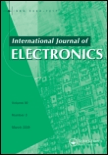
INTERNATIONAL JOURNAL OF ELECTRONICS
Navigating the Future of Electronics with Rigorous ScholarshipINTERNATIONAL JOURNAL OF ELECTRONICS, published by Taylor & Francis Ltd, is a pivotal platform for disseminating cutting-edge research in the field of Electrical and Electronic Engineering. With a rich publication history dating back to 1965, this journal is renowned for its rigorous peer-review process and its commitment to advancing knowledge across vital areas such as circuit design, communications, and microelectronics. Although it currently holds a Q3 quartile ranking in the category, the journal's broad scope and inclusion of contemporary research trends play a crucial role in shaping the future of electronics. Its ISSN (0020-7217) and E-ISSN (1362-3060) ensure that both print and digital versions are accessible. Researchers, professionals, and students alike can benefit from the journal’s valuable insights and findings contributing to advancements in technology and engineering. With its continuously evolving focus, the INTERNATIONAL JOURNAL OF ELECTRONICS stands as a significant resource in the academic landscape of electronic engineering.

Archives of Electrical Engineering
Showcasing the Future of Electrical and Electronic EngineeringArchives of Electrical Engineering, published by the Polish Academy of Sciences, is an esteemed journal dedicated to advancing the field of electrical and electronic engineering. With an ISSN of 1427-4221 and an e-ISSN of 2300-2506, this open-access journal has been providing an important platform for scholarly communication since its transition to open access in 2010, ensuring wide dissemination and accessibility of research findings globally. The journal covers a diverse range of topics within the electrical engineering domain and is recognized for its contribution to both theoretical and practical advancements in the field, as evidenced by its Q3 ranking in the 2023 category of Electrical and Electronic Engineering. It currently holds a Scopus rank of 471 out of 797, placing it in the 40th percentile. Researchers, professionals, and students are invited to explore cutting-edge research, innovations, and insights published in this pivotal journal that bridges the gap between academic excellence and industry application.
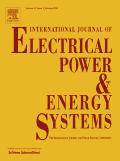
INTERNATIONAL JOURNAL OF ELECTRICAL POWER & ENERGY SYSTEMS
Illuminating Pathways in Energy ResearchINTERNATIONAL JOURNAL OF ELECTRICAL POWER & ENERGY SYSTEMS, published by ELSEVIER SCI LTD, stands at the forefront of electrical and energy engineering research, boasting an exceptional impact factor and recognition as a Q1 journal in both Electrical and Electronic Engineering and Energy Engineering and Power Technology as of 2023. Since its inception in 1979, this prestigious journal has dedicated itself to advancing the field through rigorous peer-reviewed articles, fostering innovation and collaboration among researchers, professionals, and students. With a commendable Scopus ranking—#60 in Electrical Engineering and #28 in Energy Engineering—this journal serves as an essential platform for disseminating groundbreaking findings and methodologies. Beginning in 2024, it will embrace Open Access, thereby expanding its reach and accessibility to a global audience, reinforcing its commitment to sharing knowledge and driving progress in sustainable energy systems.
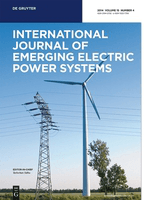
International Journal of Emerging Electric Power Systems
Empowering the Future of Energy InnovationThe International Journal of Emerging Electric Power Systems is a leading publication in the field of power engineering and technology, published by WALTER DE GRUYTER GMBH. Since its inception in 2004, this journal has served as a critical platform for researchers, professionals, and students to explore innovative solutions and advancements in the energy sector. With a focus on emerging trends and technologies, it aims to disseminate high-quality research that contributes to the sustainable development of electric power systems worldwide. Recognized in the academic community, it holds a Q3 ranking in Energy Engineering and Power Technology (2023), placing it in the 51st percentile among its peers, thus endorsing its relevance and contribution to the field. Situated in Germany, the journal's rigorous peer-review process ensures that only the most impactful research reaches its audience, facilitating the exchange of knowledge and fostering collaborative efforts in addressing the challenges of the modern energy landscape. Researchers interested in cutting-edge developments in electric power systems will find this journal an invaluable resource for their work.

IEEE Open Journal of Industry Applications
Advancing industry insights through open access research.IEEE Open Journal of Industry Applications is a premier open-access publication established in 2020 by the esteemed IEEE-INST ELECTRICAL ELECTRONICS ENGINEERS INC, dedicated to advancing the fields of Control and Systems Engineering, Electrical and Electronic Engineering, and Industrial and Manufacturing Engineering. With a strong commitment to disseminating high-quality research, the journal has rapidly garnered recognition, achieving a Q1 quartile ranking in multiple engineering categories, notably securing a rank of 21st out of 321 in Control and Systems Engineering and 26th out of 384 in Industrial and Manufacturing Engineering as of 2023. This journal not only facilitates immediate access to cutting-edge findings but also fosters an inclusive academic environment where researchers, professionals, and students can engage with and contribute to the evolving landscape of industry applications. By embracing open access, it ensures that pivotal research is freely available, thereby maximizing its impact on the scientific community. For potential contributors and readers, the journal's robust Scopus rankings—placing it in the top 7% of its fields—highlight its significance as a leading platform for innovative discussions and explorations in engineering.

Electrical Engineering & Electromechanics
Pioneering Research in Electromechanical ExcellenceElectrical Engineering & Electromechanics, published by the Natl Technical University, Kharkiv Polytechnic Institute, is a leading open access journal that has been disseminating cutting-edge research in the fields of electrical and electronic engineering, energy engineering, and mechanical engineering since its inception in 2006. With ISSN 2074-272X, this journal not only contributes to the advancement of engineering science but also provides a platform for knowledge sharing among researchers, professionals, and students globally. The journal holds a notable position within the academic community, being classified as Q3 in 2023 across multiple categories, highlighting its relevance and influence in the engineering discipline. With Scopus rankings revealing its percentile standing, the journal is positioned to foster innovation and discussion in a rapidly evolving field. The open access model ensures that all published articles are freely available, enhancing the visibility and impact of high-quality research. As it converges towards the years of 2019 to 2024, Electrical Engineering & Electromechanics aims to continually publish groundbreaking studies while encouraging contributions that drive technology and electrical advancements forward.
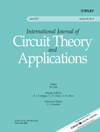
INTERNATIONAL JOURNAL OF CIRCUIT THEORY AND APPLICATIONS
Unveiling the Future of Circuit Theory and TechnologyINTERNATIONAL JOURNAL OF CIRCUIT THEORY AND APPLICATIONS serves as a premier platform for researchers and practitioners in the fields of applied mathematics, electrical and electronic engineering, and materials science. Published by Wiley, this esteemed journal, with an ISSN of 0098-9886 and an E-ISSN of 1097-007X, has been in circulation since 1973, providing insightful contributions and advanced research findings through 2024. It holds a commendable reputation across multiple disciplines, reflected in its 2023 ranking in the Q3 category across applied mathematics, computer science applications, and electronic materials. Researchers engaging with this journal can expect rigorous peer-reviewed articles that address both theoretical and practical implications, thereby fostering advancements in circuit theory and its multitude of applications. While the journal is not open access, it continues to play a significant role in disseminating high-caliber research crucial for scholars and professionals alike.

IEEE Open Access Journal of Power and Energy
Unlocking New Frontiers in Electrical and Energy EngineeringIEEE Open Access Journal of Power and Energy is a leading scholarly publication dedicated to advancing research and innovation in the fields of electrical and electronic engineering as well as energy engineering and power technology. Published by the prestigious IEEE-INST ELECTRICAL ELECTRONICS ENGINEERS INC, this fully open-access journal has been a vital resource for the dissemination of impactful findings since its establishment in 2020. With an impressive Q1 ranking in both Electrical and Electronic Engineering and Energy Engineering and Power Technology, it has garnered recognition for its rigorous peer-review process and quality content. Moreover, it ranks favorably within the top percentiles of Scopus, acknowledging its contributions to the global discourse on energy solutions. The journal offers unique access options that encourage broader readership and collaboration among researchers, professionals, and students eager to explore the latest advancements in power and energy systems. Located in the United States, this journal plays an essential role in shaping the future of sustainable energy and technological innovation.
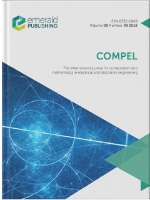
COMPEL-THE INTERNATIONAL JOURNAL FOR COMPUTATION AND MATHEMATICS IN ELECTRICAL AND ELECTRONIC ENGINEERING
Transforming Challenges into Solutions through ComputationCOMPEL - THE INTERNATIONAL JOURNAL FOR COMPUTATION AND MATHEMATICS IN ELECTRICAL AND ELECTRONIC ENGINEERING is a leading peer-reviewed journal published by Emerald Group Publishing Ltd, dedicated to advancing the fields of computation and mathematical applications in electrical and electronic engineering. Since its inception in 1982, the journal has been a pivotal resource for researchers, professionals, and students alike, promoting innovative methodologies and contributing to the knowledge base within its scope. With a current impact factor reflecting its growing influence, COMPEL offers valuable insights across several quartile categories, allowing contributors to engage with important advancements in applied mathematics and computational theory. Although it operates under a subscription model, the journal ensures that accessible and impactful research reaches a wide audience. As it continues to converge towards its milestone in 2024, COMPEL remains an essential platform for those seeking to explore the interplay between complex computational challenges and engineering solutions.

International Journal of Power and Energy Systems
Pioneering Research for a Sustainable TomorrowInternational Journal of Power and Energy Systems, published by ACTA PRESS, serves as a vital platform for research and discourse in the multifaceted fields of applied mathematics, electrical and electronic engineering, and energy engineering. With an ISSN of 1078-3466 and an E-ISSN of 1710-2243, this journal covers a broad spectrum of topics pertinent to power and energy systems, showcasing innovative research from its inception in 1996 through to its projected contributions in 2024. Operating from Calgary, Canada, the journal, though not currently open access, provides invaluable insights into the challenges and advancements within these domains, as reflected in its categorization in the Q4 quartile across multiple indices. Despite being positioned in lower output percentiles in 2023 rankings on Scopus—specifically, #212 in Energy Engineering and Power Technology—it remains a critical resource for scholars seeking to expand the frontiers of knowledge in energy sustainability and system efficiency. Researchers, professionals, and students alike will find the journal’s commitment to fostering academic dialogue and disseminating pioneering results both essential and inspiring.